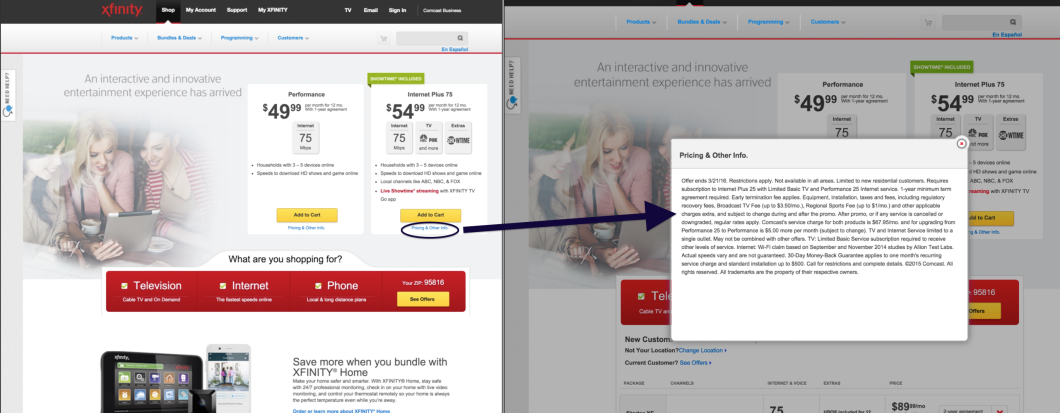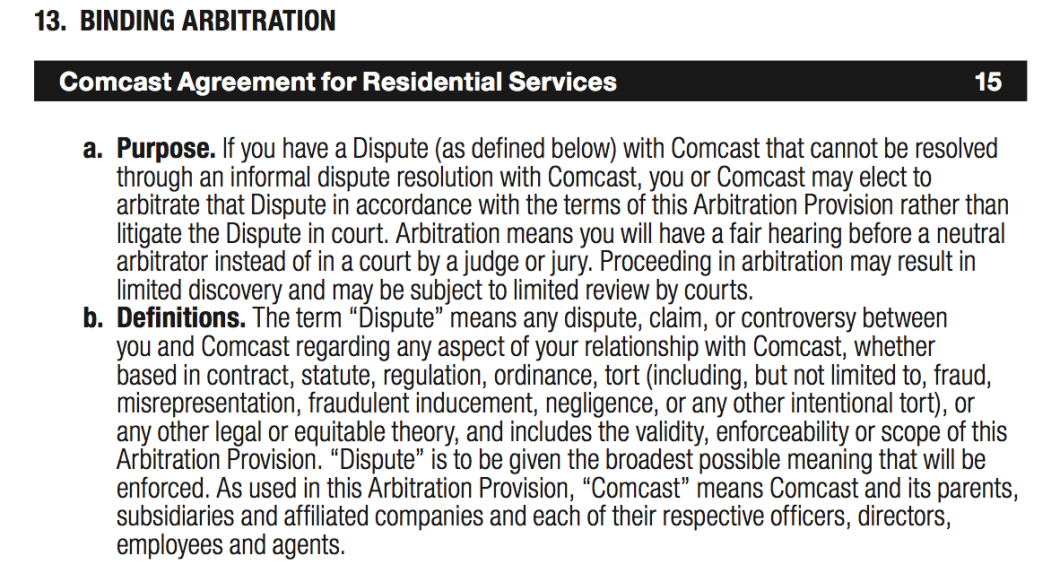Customers Accuse Comcast Of Using “Broadcast TV” & “Regional Sports” Fees To Illegally Hike Rates
As we showed in our recent line-by-line breakdowns of charges on your cable bills, many pay-TV providers charge fees that have the effect of raising the customers’ monthly bill but without affecting the base rate the cable company advertises. Now, Comcast subscribers in seven different states are claiming that these fees are “illegal and deceptive” that have netted the cable giant billions of dollars.
The complaint [PDF], filed Oct. 15 in a federal court in California, involves two specific fees charged by Comcast: The “Broadcast TV Fee” and the “Regional Sports Fee.”
Land Of The Fee
Comcast first announced the Broadcast TV Fee in 2013, as a way to recover some of what the cable provider pays to carry the over-the-air networks. That presumably includes NBC, which is owned by Comcast.
[Ed. Note: After obtaining and then reading through this complaint, we noticed that our 2013 story on this fee is actually quoted in the lawsuit. Small world, huh.]
This fee started out at $1.50 but in our 2015 review of cable bills, it had already jumped up to $5.00. With some 20 million pay-TV customers nationwide, that’s around $100 million per month that Comcast is bringing in from this one fee alone.
The Regional Sports Fee, introduced in early 2015, is a similar recovery fee that allows Comcast to recoup some of the money it has spent on airing regional sports networks — again, this would seem to include the many Comcast Sports Network channels around the country. According to the complaint, this fee started at $1/month but now stands at $4.50/month in most markets.
“Comcast applies these fee increases to all customers, even to those in the middle of one-year or two-year contracts at a promised fixed monthly rate,” explains the lawsuit, which accuses Comcast of violating the terms of these customers’ contracts. “By increasing these fees in the middle of the contract term, Comcast has found a way to secretly and repeatedly increase the monthly price it charges for its channel packages despite its promise to charge a flat rate for one or two years.”
Big Company, Tiny Print
The plaintiffs allege that Comcast is falsely advertising its monthly rates by not properly disclosing these two fees that can add nearly $10/month to your bill. The complaint includes a copy of a direct mail marketing piece sent to one plaintiff that advertises a rate of $89.99/month, but only reveals in the fine print on the bottom of the second page that there is a $3.50/month Broadcast TV Fee and a $1/month Regional Sports fee — and that these charges are “subject to change during and after the promo.”
Beyond the allegedly confusing disclosure of these fees, the plaintiffs contend that Comcast is misleadingly trying to make it look like these are official fees that the company is required to collect from consumers.
“Comcast intentionally does not explain or define what the Broadcast TV Fee and the Regional Sports Fee are – even in the fine print,” argues the complaint. “Instead, Comcast deceptively groups these ‘fees’ in the fine print with ‘taxes and fees, including regulatory recovery fees.’ A consumer reading the fine print would reasonably assume the Broadcast TV Fee and the Regional Sports Fee relate to government fees or taxes.”
Likewise, on the Comcast Xfinity website, the plaintiffs claim that Comcast goes out of its way to not disclose that these fees are mandatory for most customers and serve as de facto rate increases.
For example, the site advertises that you can get the Internet Plus 75 bundle for $54.99/month, and this includes “local channels like ABC, NBC & FOX.” However, the plaintiffs say the $54.99 rate is “false and misleading,” as there is a mandatory Broadcast TV fee charged just to watch the very channels Comcast lists in the marketing material.
“There is no asterisk or qualifier next to the advertised $54.99 price,” notes the lawsuit, pointing out that this fee information is only disclosed by clicking on a small link titled “Pricing & Other Info” that brings up a box full of fine print that includes details on the fees:

The plaintiffs further allege that Comcast deliberately obscures these mandatory add-on fees during the purchasing process. At some point after March 2016, it even replaced the fine-print “Pricing & Other Info” link on the order-submission page with a link to a “Minimum Term Agreement” page:

Furthering The Fiction
According to the lawsuit, Comcast staff is helping to perpetuate the idea that these fees are required by law, as opposed merely being allowed by law.
A plaintiff from Colorado says she placed her Comcast order over the phone, and that she explicitly asked the Comcast sales rep about the fees and taxes that would be added to her bill.
“The agent estimated the tax charges, and falsely stated that there would be no additional charges with the sole exception of FCC mandated fees,” reads the complaint.
Investigators for the plaintiffs’ attorneys allege that they repeatedly ran up against this same sort of false claim while talking to Comcast’s online sales reps.
“Every single chat agent falsely stated that there would be no additional charges above the advertised price except for government taxes,” alleges the lawsuit, which says the online chat reps repeated the same canned response that “Taxes would vary depending on your area and the services you will be getting. For double play bundles, it usually ranges between $10-$20 per month.”
But the plaintiffs say that this characterization of the additional charges is misleading. “In truth, most of the $10-$20 bill increase above the advertised package price is not due to ‘taxes’ as Comcast falsely states,” explains the complaint, which uses the example of customers in Sacramento, where taxes would only add $1.50/month, far short of even the low-end $10/month estimate given by Comcast reps.
The lawsuit alleges that this overestimation of taxes is a deliberate attempt to cover up the fact that Comcast’s fees can significantly boost the price of your service.
The plaintiffs allege, among other things, breach of contract, unjust enrichment, and violations of state consumer protection statutes in California, Colorado, Florida, Illinois, New Jersey, Ohio, and Washington.
Arbitration Shmarbitration
Our immediate reaction to any story about a class-action lawsuit filed against any large cable company is usually “good luck,” as Comcast and all the other major providers use forced arbitration clauses that bar customers from joining in class actions.
However, the attorneys in this case believe the lawsuit can survive a motion to compel arbitration. First, each of the eight defendants claims to have exercised their right to opt out of the Comcast arbitration clause within the 30-day window of opening their accounts. This should allow them to at least avoid Comcast’s initial attempt to halt the case in its tracks, and the court could certify a class representing only those other, few Comcast customers who also opted out.
Yet the lawyers for the plaintiff tell Consumerist they believe they can successfully argue that all affected Comcast customers deserve to be part of the plaintiff class.
For customers who just began their Comcast service in the last few weeks, or who sign up pending the resolution of the lawsuit, the plaintiffs argue that this lawsuit should serve to stay the 30-day opt-out window, and that these new customers shouldn’t be controlled by the arbitration clause.
For the rest of the millions of Comcast customers, plaintiffs’ attorney Dan Hattis tells Consumerist that he believes that the terms of the current Comcast arbitration clause “do not prohibit those class members from being part of this class action lawsuit or from filing claims in a class action lawsuit.”
Hattis argues that, before March 23, 2016, the Residential Services Agreement posted on Comcast’s website stated that arbitration was elective, and not required. It read: “If you have a Dispute (as defined below) with Comcast that cannot be resolved through an informal dispute resolution with Comcast, you or Comcast may elect to arbitrate that Dispute in accordance with the terms of this Arbitration Provision rather than litigate the Dispute in court.” The catch, contends Hattis, is that class action claims were not explicitly included in the definition of a “Dispute” that may be subject to arbitration:

Comcast changed the text of the arbitration agreement in March 2016 to clarify that class actions are actually barred. The plaintiffs contend that this change was made in response to a Dec. 2015 letter sent on behalf of one of the plaintiffs.
“Comcast’s new arbitration clause now specifies that arbitration is mandatory (rather than elective),” explains Hattis. “However, Comcast has made no effort whatsoever to notify or obtain the consent of its existing customers to the terms of the new arbitration clause except for posting it to its website.”
Hattis also notes that the terms posted on Comcast’s site — as of the time of filing the complaint — did not reflect the date on which the arbitration agreement had last been updated.
Finally, Hattis tells Consumerist that the plaintiffs will argue that the arbitration clause is generally substantively unconscionable, illusory, and unenforceable, and that the class members were not informed of and/or did not give their assent to the Residential Services Agreement and its arbitration clause.
We’ve reached out to Comcast for comment on this story, but have not yet heard back.
Given the court system’s current pro-arbitration bent, this case faces an uphill battle just to get over the first few legal hurdles, but if it is allowed to move forward it could significantly impact the way cable and satellite companies advertise their rates.
Want more consumer news? Visit our parent organization, Consumer Reports, for the latest on scams, recalls, and other consumer issues.

